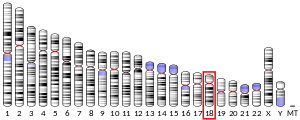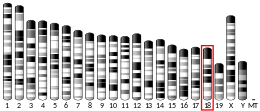GTP-binding protein Rit2 is a protein that in humans is encoded by the RIT2 gene.[5][6][7]
RIN belongs to the RAS (HRAS; MIM 190020) superfamily of small GTPases (Shao et al., 1999).[supplied by OMIM][7]
RIT2 has been associated with Parkinson's disease in two large genetic studies.[8][9] An gene expression study of postmortem brain has suggested RIT2 interacts with interferon-γ signalling.[10]
Interactions
editReferences
edit- ^ a b c GRCh38: Ensembl release 89: ENSG00000152214 – Ensembl, May 2017
- ^ a b c GRCm38: Ensembl release 89: ENSMUSG00000057455 – Ensembl, May 2017
- ^ "Human PubMed Reference:". National Center for Biotechnology Information, U.S. National Library of Medicine.
- ^ "Mouse PubMed Reference:". National Center for Biotechnology Information, U.S. National Library of Medicine.
- ^ Lee CH, Della NG, Chew CE, Zack DJ (November 1996). "Rin, a neuron-specific and calmodulin-binding small G-protein, and Rit define a novel subfamily of ras proteins". The Journal of Neuroscience. 16 (21): 6784–94. doi:10.1523/JNEUROSCI.16-21-06784.1996. PMC 6579259. PMID 8824319.
- ^ Wes PD, Yu M, Montell C (November 1996). "RIC, a calmodulin-binding Ras-like GTPase". The EMBO Journal. 15 (21): 5839–48. doi:10.1002/j.1460-2075.1996.tb00971.x. PMC 452332. PMID 8918462.
- ^ a b "Entrez Gene: RIT2 Ras-like without CAAX 2".
- ^ Pankratz N, Beecham GW, DeStefano AL, Dawson TM, Doheny KF, Factor SA, Hamza TH, Hung AY, Hyman BT, Ivinson AJ, Krainc D, Latourelle JC, Clark LN, Marder K, Martin ER, Mayeux R, Ross OA, Scherzer CR, Simon DK, Tanner C, Vance JM, Wszolek ZK, Zabetian CP, Myers RH, Payami H, Scott WK, Foroud T (March 2012). "Meta-analysis of Parkinson's disease: identification of a novel locus, RIT2". Annals of Neurology. 71 (3): 370–84. doi:10.1002/ana.22687. PMC 3354734. PMID 22451204.
- ^ Nalls MA, Pankratz N, Lill CM, Do CB, Hernandez DG, Saad M, et al. (September 2014). "Large-scale meta-analysis of genome-wide association data identifies six new risk loci for Parkinson's disease" (PDF). Nature Genetics. 46 (9): 989–93. doi:10.1038/ng.3043. hdl:11858/00-001M-0000-0026-AA42-8. PMC 4146673. PMID 25064009.
- ^ Liscovitch N, French L (2014). "Differential Co-Expression between α-Synuclein and IFN-γ Signaling Genes across Development and in Parkinson's Disease". PLOS ONE. 9 (12): e115029. Bibcode:2014PLoSO...9k5029L. doi:10.1371/journal.pone.0115029. PMC 4262449. PMID 25493648.
- ^ Calissano M, Latchman DS (August 2003). "Functional interaction between the small GTP-binding protein Rin and the N-terminal of Brn-3a transcription factor". Oncogene. 22 (35): 5408–14. doi:10.1038/sj.onc.1206635. PMID 12934100. S2CID 670567.
Further reading
edit- Shao H, Kadono-Okuda K, Finlin BS, Andres DA (November 1999). "Biochemical characterization of the Ras-related GTPases Rit and Rin". Archives of Biochemistry and Biophysics. 371 (2): 207–19. doi:10.1006/abbi.1999.1448. PMID 10545207.
- Hoshino M, Nakamura S (July 2002). "The Ras-like small GTP-binding protein Rin is activated by growth factor stimulation". Biochemical and Biophysical Research Communications. 295 (3): 651–6. doi:10.1016/S0006-291X(02)00731-3. PMID 12099688.
- Calissano M, Latchman DS (August 2003). "Functional interaction between the small GTP-binding protein Rin and the N-terminal of Brn-3a transcription factor". Oncogene. 22 (35): 5408–14. doi:10.1038/sj.onc.1206635. PMID 12934100. S2CID 670567.
- Hartwig C, Veske A, Krejcova S, Rosenberger G, Finckh U (August 2005). "Plexin B3 promotes neurite outgrowth, interacts homophilically, and interacts with Rin". BMC Neuroscience. 6: 53. doi:10.1186/1471-2202-6-53. PMC 1215486. PMID 16122393.
- Shi GX, Han J, Andres DA (November 2005). "Rin GTPase couples nerve growth factor signaling to p38 and b-Raf/ERK pathways to promote neuronal differentiation". The Journal of Biological Chemistry. 280 (45): 37599–609. doi:10.1074/jbc.M507364200. PMID 16157584.
- Rual JF, Venkatesan K, Hao T, Hirozane-Kishikawa T, Dricot A, Li N, Berriz GF, Gibbons FD, Dreze M, Ayivi-Guedehoussou N, Klitgord N, Simon C, Boxem M, Milstein S, Rosenberg J, Goldberg DS, Zhang LV, Wong SL, Franklin G, Li S, Albala JS, Lim J, Fraughton C, Llamosas E, Cevik S, Bex C, Lamesch P, Sikorski RS, Vandenhaute J, Zoghbi HY, Smolyar A, Bosak S, Sequerra R, Doucette-Stamm L, Cusick ME, Hill DE, Roth FP, Vidal M (October 2005). "Towards a proteome-scale map of the human protein-protein interaction network". Nature. 437 (7062): 1173–8. Bibcode:2005Natur.437.1173R. doi:10.1038/nature04209. PMID 16189514. S2CID 4427026.




